
Empowering Rural Communities: The Transformative Role of Solar Energy
In the quiet rural parts of India, far from the bustling cities and urban landscapes, lies a world of opportunity. These rural areas, often overlooked in discussions about energy access and sustainability, are experiencing a revolution powered by the sun. Solar energy is not just a technological marvel; it’s a lifeline for millions of people living in remote villages and challenging terrains across the country.
Energy Poverty in Rural Areas
For many rural communities, access to reliable electricity remains a distant dream. Conventional energy infrastructure often fails to reach these areas due to their remote locations, rugged terrain, or economic constraints. Those areas with access to electricity are challenged with irregular supply and load shedding, leading to frequent power outages. This erratic supply affects households, schools, and businesses, forcing communities to adjust their lives around the limited availability of power.
Solar Energy: A Beacon of Hope
In this landscape of erratic energy supply, solar power emerges as a beacon of hope. Its decentralized nature and modular design make it particularly well-suited for rural electrification. Solar panels can be installed on rooftops, above wells, open fields, or even integrated into everyday objects, bringing electricity to places where traditional power lines are economically unviable. With low maintenance and readily available spare parts, solar energy has proven transformative for these communities.
Transformative Impact
The use of solar energy in rural areas brings a multitude of transformative benefits:
- Improved Quality of Life: Access to electricity enables rural communities to light their homes and access water through solar pumps, enhancing safety and security, particularly at night. It also facilitates activities such as studying and socializing after nightfall.
- Educational Opportunities: Solar energy enables schools to power computers, projectors, and provide internet connectivity, expanding educational opportunities for children in rural communities.
- Economic Empowerment: Solar-powered pumps and dryers support irrigation and agricultural processing facilities, providing reliable electricity for pumping water and drying machinery. This stimulates economic activity and creates job opportunities within the community.
- Environmental Sustainability: By harnessing clean, renewable energy from the sun, rural communities can reduce their reliance on fossil fuels, mitigating environmental degradation and contributing to global efforts to combat climate change.
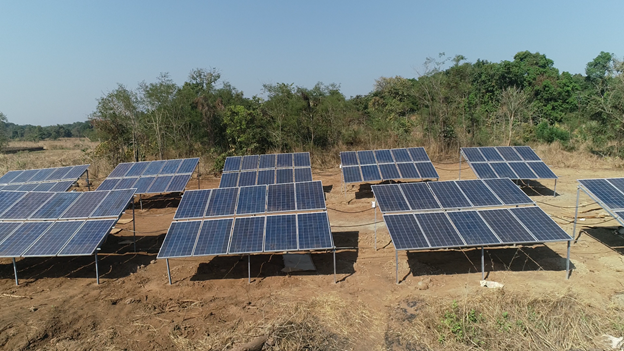
Solar Panels at a Swades Village
Overcoming Challenges
Despite its numerous benefits, the widespread adoption of solar energy in rural areas faces several challenges, including upfront costs and the technical expertise required for installation and maintenance. However, innovative financing models, capacity-building initiatives, and supportive government policies can help overcome these obstacles and accelerate the transition to solar energy in rural communities.
Swades Foundation: Lighting Up Lives with Solar Power
Swades Foundation, a renowned non-profit organization dedicated to empowering rural communities, has been at the forefront of implementing solar energy projects in India’s villages. Take a look at some of our transformative initiatives:
Real Stories of Transformation
Solar Conversion Schemes
Swades Foundation’s Solar Conversion Schemes aim to replace electric pumps with solar pumps for drinking water schemes. This initiative addresses water shortages caused by irregular electricity supply and high electricity bills, averaging Rs. 2000 per month. By converting to solar pumps, communities can save on electricity charges and ensure continuous water supply, even during power outages caused by natural calamities.
Outcome/Benefits:
- Saves electricity costs, allowing funds to be used for other operations and maintenance activities.
- Ensures water supply during power outages, enhancing community resilience.
Solar Fencing for Farms
Swades Foundation has supported over 3600 farmers with irrigation systems that enable them to harvest an additional, second crop. This also opens up opportunities to utilise the interval between crops for a cash crop with a shorter season. The often-overlooked challenge is crop damage by animals. Traditional methods to protect crops are either inefficient or expensive. To address this, Swades Foundation provides solar power-based electrical fencing systems, protecting crops from both domestic and wild animals.
Outcome/Benefits:
- Prevents crop loss, estimated at Rs. 20,000 per 10 guntas.
- In FY 2022-23, installed solar fencing on 53 plots, saving an estimated Rs. 42.40 lakhs in crop loss.
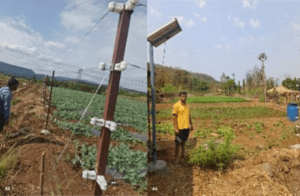
Solar Fencing for farms at a Swades Village
Solar Street Lights
Provision of solar street lights in poorly lit common areas of villages ensures safety and security, especially for women, young girls, and the elderly. It also provides protection against wild animals and facilitates evening activities and studies for children.
Outcome/Benefits:
- Provides lighting in remote villages where government electric street lights are unavailable.
- Enhances safety and security.
Home Solar Kits
Swades Foundation provides solar units to households without electricity, offering an energy-saving and cost-effective solution. These kits power small homes, providing light and mobile charging facilities.
Outcome/Benefits:
- Saves energy and costs.
- Increases home value.
- Provides a sustainable, renewable energy source.
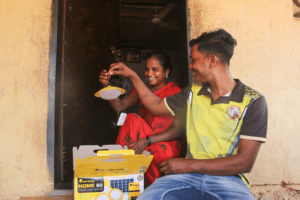
Home Solar Unit provided by Swades Foundation to a beneficiary
Solar for Schools and Anganwadis
Provision of solar panels in schools and anganwadis ensures reliable power for lighting and fans, reducing electricity bills and allowing savings to be used for other expenses.
Outcome/Benefits:
- Reduces electricity bills.
- Improves learning environments.
Swades Beneficiary Testimonial
Devram Kirugavari from Mogre Village, Igatpuri Taluka, Nashik, his village has received solar powered street lights.
“There was no light on the main road, and there was always a fear of wild animals at night. Now, with the roads lit by solar street lights, even small children and milkmen can travel safely. Previously, without electricity, we had instances of wild animals, like tigers, entering the cowsheds. Thanks to Swades and Honeywell, we have received solar streetlights for 3 km, which has drastically reduced our electricity bill. This dream of having street lights powered by solar energy has come true, making our village safer and more secure. Additionally, we can now grind our wheat efficiently, further improving our daily lives.”
Reducing Carbon Emissions
In addition to the immediate benefits for communities, our solar power projects significantly reduce carbon emissions. Here are the details of the carbon reduction achieved through various Swades solar power projects during 2022-23:
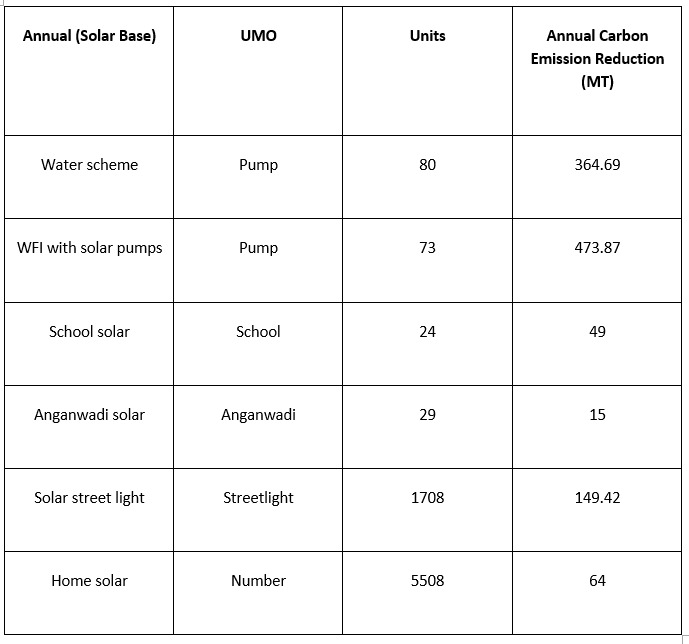
Visit this page to know more about Swadess Solar Power Initiatives
Examples of Solar Energy Adoption from Around the World
Morocco’s Solar Power Plant
Morocco is home to one of the world’s largest solar power plants, the Noor Ouarzazate Solar Complex. This massive solar farm covers thousands of acres of desert and provides electricity to over a million people. It’s a shining example of how solar energy can be harnessed in arid regions to meet the energy needs of a growing population.

Moroccos Ouarzazate Noor Solar Plant Supplies 2 Million Moroccans with Electricity
Image courtesy: https://www.moroccoworldnews.com
Bangladesh’s Solar Home Systems
In Bangladesh, the government has implemented a widespread home solar system program. Through this initiative, millions of households in rural areas now have access to electricity for the first time. The program has not only improved the quality of life for these communities but has also reduced the country’s reliance on fossil fuels.
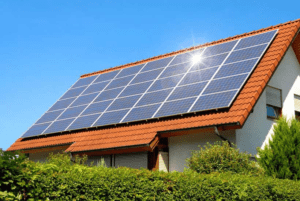
Bangladesh Solar Home Systems Provide Clean Energy for 20 million People Modern Diplomacy, Image Courtesy: https://moderndiplomacy.eu
Conclusion: A Brighter Future
As we strive towards sustainable development and universal energy access, the role of solar energy in rural areas becomes increasingly pivotal. By harnessing the power of the sun, we can empower rural communities, improve livelihoods, and build a more inclusive and sustainable future for all. Together, let’s illuminate the path to prosperity and opportunity in every corner of the globe, one village solar panel at a time.
About the Author
Bejoy Davis Chiramel is a Sr. Director at Swades Foundation, with 28 years of experience in water, sanitation, irrigation, and construction management. His expertise lies in designing and implementing sustainable solutions to address water scarcity and sanitation issues. Bejoy advocates for solar-related initiatives that promote sustainable water management.